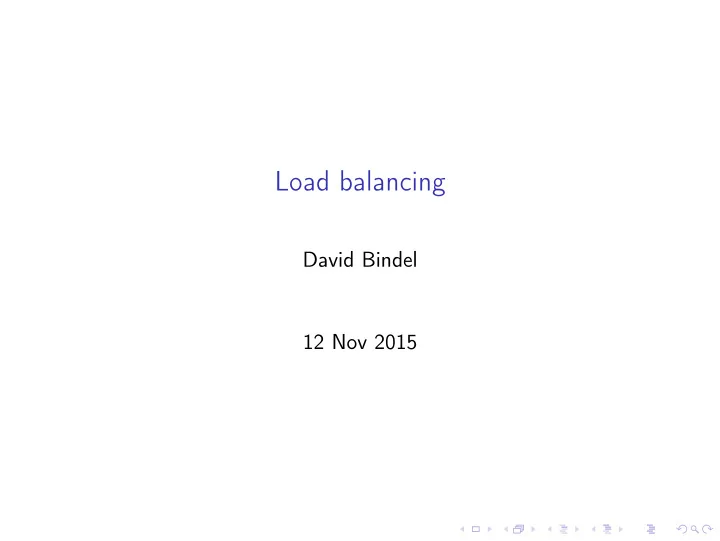

Load balancing David Bindel 12 Nov 2015
Inefficiencies in parallel code ◮ Poor single processor performance ◮ Typically in the memory system ◮ Saw this in matrix multiply assignment ◮ Overhead for parallelism ◮ Thread creation, synchronization, communication ◮ Saw this in shallow water assignment ◮ Load imbalance ◮ Different amounts of work across processors ◮ Different speeds / available resources ◮ Insufficient parallel work ◮ All this can change over phases
Where does the time go? ◮ Load balance looks like high, uneven time at synchronization ◮ ... but so does ordinary overhead if synchronization expensive! ◮ And spin-locks may make synchronization look like useful work ◮ And ordinary time sharing can confuse things more ◮ Can get some help from profiling tools
Reminder: Graph partitioning ◮ Graph G = ( V , E ) with vertex and edge weights ◮ Try to evenly partition while minimizing edge cut (comm volume) ◮ Optimal partitioning is NP complete – use heuristics ◮ Spectral ◮ Kernighan-Lin ◮ Multilevel ◮ Tradeoff quality vs speed ◮ Good software exists (e.g. METIS)
The limits of graph partitioning What if ◮ We don’t know task costs? ◮ We don’t know the communication pattern? ◮ These things change over time? May want dynamic load balancing.
Basic parameters ◮ Task costs ◮ Do all tasks have equal costs? ◮ When are costs known (statically, at creation, at completion)? ◮ Task dependencies ◮ Can tasks be run in any order? ◮ If not, when are dependencies known? ◮ Locality ◮ Should tasks be on the same processor to reduce communication? ◮ When is this information known?
Task costs ◮ Easy: equal unit cost tasks ◮ Branch-free loops ◮ Harder: different, known times ◮ Example: general sparse matrix-vector multiply ◮ Hardest: task cost unknown until after execution ◮ Example: search
Dependencies ◮ Easy: dependency-free loop (Jacobi sweep) ◮ Harder: tasks have predictable structure (some DAG) ◮ Hardest: structure changes dynamically (search, sparse LU)
Locality/communication ◮ Easy: tasks don’t communicate except at start/end (embarrassingly parallel) ◮ Harder: communication is in a predictable pattern (elliptic PDE solver) ◮ Communication is unpredictable (discrete event simulation)
A spectrum of solutions How much we can do depends on cost, dependency, locality ◮ Static scheduling ◮ Everything known in advance ◮ Can schedule offline (e.g. graph partitioning) ◮ Example: Shallow water solver ◮ Semi-static scheduling ◮ Everything known at start of step (or other determined point) ◮ Can use offline ideas (e.g. Kernighan-Lin refinement) ◮ Example: Particle-based methods ◮ Dynamic scheduling ◮ Don’t know what we’re doing until we’ve started ◮ Have to use online algorithms ◮ Example: most search problems
Search problems ◮ Different set of strategies from physics sims! ◮ Usually require dynamic load balance ◮ Example: ◮ Optimal VLSI layout ◮ Robot motion planning ◮ Game playing ◮ Speech processing ◮ Reconstructing phylogeny ◮ ...
Example: Tree search ◮ Tree unfolds dynamically during search ◮ May be common subproblems along different paths (graph) ◮ Graph may or may not be explicit in advance
Search algorithms Generic search: Put root in stack/queue while stack/queue has work remove node n from queue if n satisfies goal, return mark n as searched add viable unsearched children of n to stack/queue (Can branch-and-bound) Variants: DFS (stack), BFS (queue), A ∗ (priority queue), ...
Simple parallel search ◮ Static load balancing: each new task on an idle processor until all have a subree ◮ Not very effective without work estimates for subtrees! ◮ How can we do better?
Centralized scheduling Idea: obvious parallelization of standard search ◮ Shared data structure (stack, queue, etc) protected by locks ◮ Or might be a manager task Teaser: What could go wrong with this parallel BFS? Put root in queue fork obtain queue lock while queue has work remove node n from queue release queue lock process n , mark as searched obtain queue lock add viable unsearched children of n to queue release queue lock join
Centralized task queue ◮ Called self-scheduling when applied to loops ◮ Tasks might be range of loop indices ◮ Assume independent iterations ◮ Loop body has unpredictable time (or do it statically) ◮ Pro: dynamic, online scheduling ◮ Con: centralized, so doesn’t scale ◮ Con: high overhead if tasks are small
Variations on a theme How to avoid overhead? Chunks! (Think OpenMP loops) ◮ Small chunks: good balance, large overhead ◮ Large chunks: poor balance, low overhead ◮ Variants: ◮ Fixed chunk size (requires good cost estimates) ◮ Guided self-scheduling (take ⌈ R / p ⌉ work, R = tasks remaining) ◮ Tapering (estimate variance; smaller chunks for high variance) ◮ Weighted factoring (like GSS, but take heterogeneity into account)
Beyond centralized task queue Basic distributed task queue idea: ◮ Each processor works on part of a tree ◮ When done, get work from a peer ◮ Or if busy, push work to a peer ◮ Requires asynch communication Also goes by work stealing, work crews... Implemented in Cilk, X10, CUDA, ...
Picking a donor Could use: ◮ Asynchronous round-robin ◮ Global round-robin (keep current donor pointer at proc 0) ◮ Randomized – optimal with high probability!
Diffusion-based balancing ◮ Problem with random polling: communication cost! ◮ But not all connections are equal ◮ Idea: prefer to poll more local neighbors ◮ Average out load with neighbors = ⇒ diffusion!
Mixed parallelism ◮ Today: mostly coarse-grain task parallelism ◮ Other times: fine-grain data parallelism ◮ Why not do both? ◮ Switched parallelism: at some level switch from data to task
Recommend
More recommend